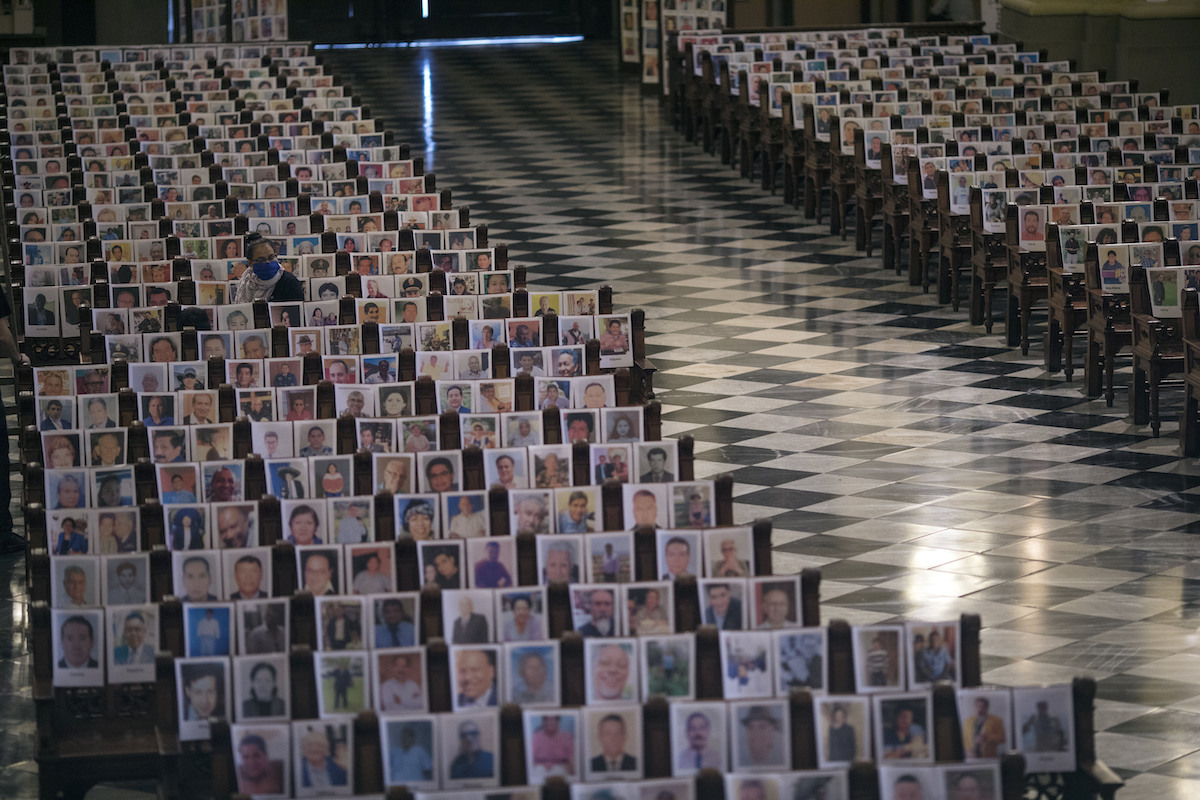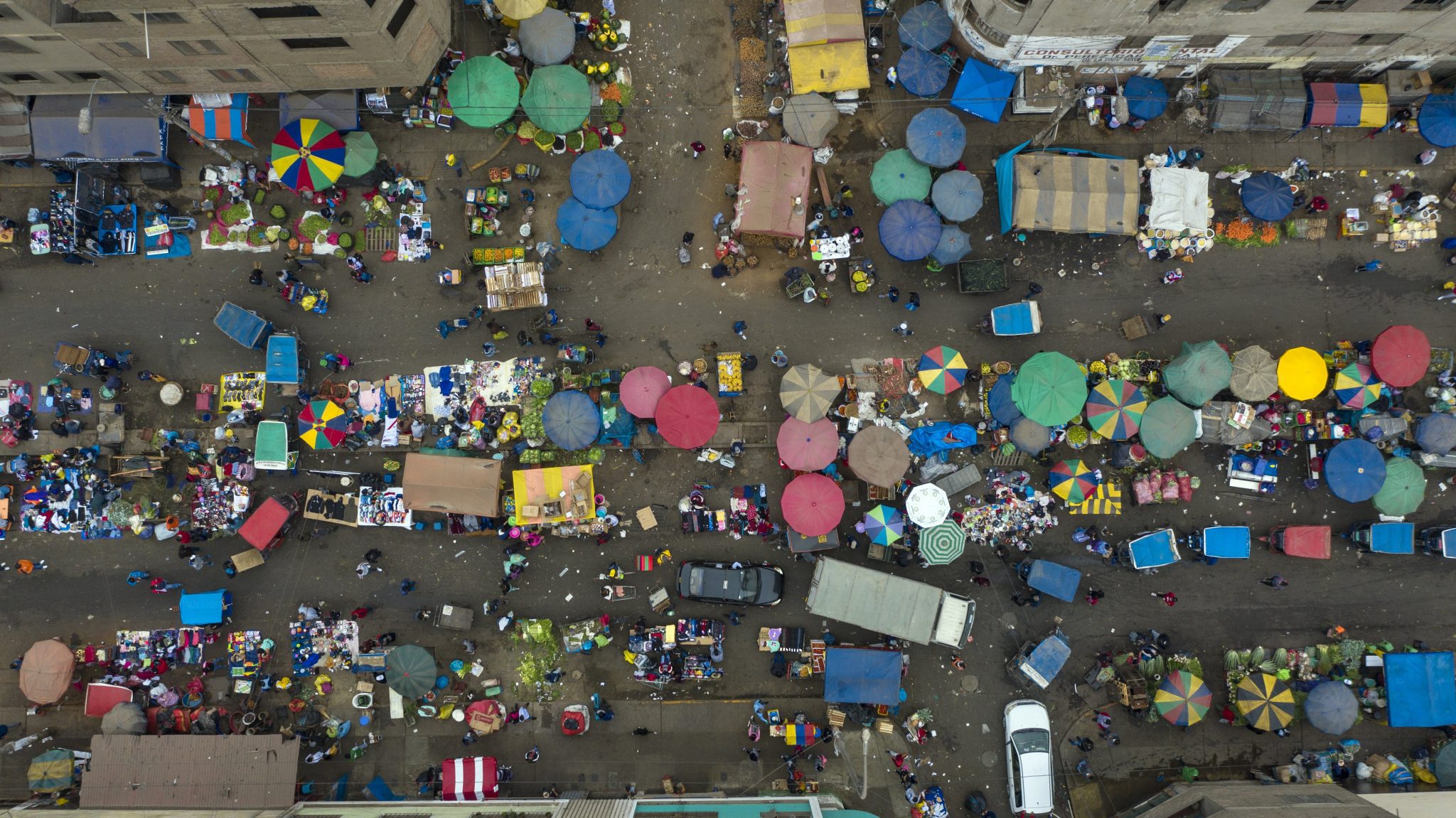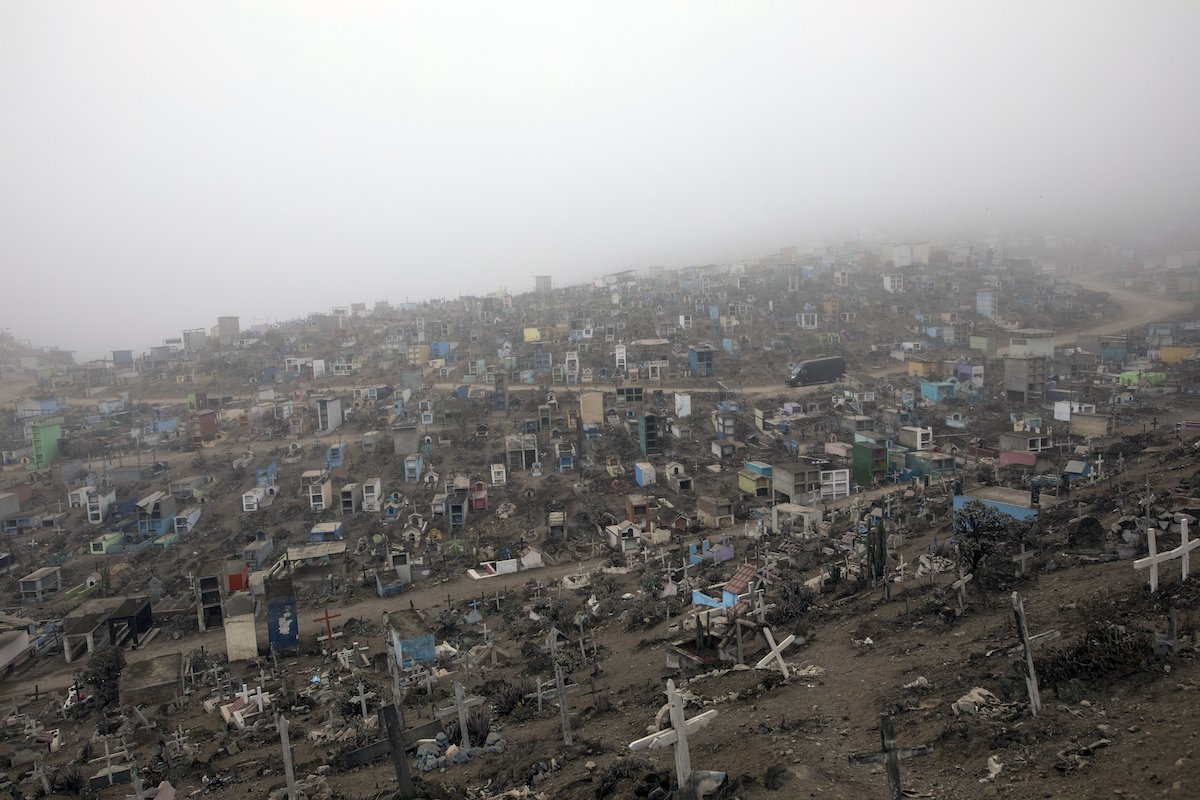

A woman sits among portraits of people who died due to the COVID-19, inside the Cathedral, in Lima, Peru, Saturday, June 13, 2020. (AP Photo/Rodrigo Abd)
NEWARK — Every morning, in the heart of downtown Paterson, NJ, often known as “Peru Square,” owner Isai Valencia wakes up at 5 a.m. to make sure all the shelves at Los Inmortales is well-stocked with Peruvian products such as Sazonador Sibarita and Inca Kolas. Across the street, Carlos Vera, owner of Panchito’s Restaurant, fires up the industrial size rotisserie and places well-seasoned chickens in a skewer for their signature dish: Pollo a la Brasa.
With a big sign in Spanish that reads, “No mask, no service,” Los Inmortales and Panchito’s opened their doors to patrons looking for a little taste of home in these uncertain times.
However, like many Latino business across the country, the COVID-19 pandemic has forced them to work at a 50% capacity.
“Luckily, we have continued working,” Valencia said, who opened the Los Inmortales bodega 27 years ago. “We had reduced staff hours and give them more days off. But it’s not the same.”
Similarly, Vera had also been forced to reduce his services to pick-up only, the first time since their opening 35 years ago.
“We have to continue working and recover for next year,” Vera said. “Let’s just hope we can recover.”
Even though they had to reduce their business, Valencia and Vera are thankful that their businesses continue operating, and they are lucky their loved ones are healthy and safe. But as COVID-19 cases are on the rise in their home country, they feel Peru’s current government has failed.
On July 14, Peru’s department of health (MINSA) announced 333,867 positive COVID-19 cases and 12,229 deaths, becoming the fifth country with most positive cases in the world. As of July 17, Johns Hopkins reported 341,586 positive cases in Peru.


“There is no government support. No medicines,” Valencia said. “People live in poverty and they have to decide if they go to work and possible infect their family, or don’t eat.”
“The hospitals are collapsing. It’s very sad watching the news,” Vera said. “We are the lucky ones.”
Situation Dire
In Peru, the situation is dire.
Margarita Romero experienced this firsthand when her brother-in-law was rushed to the hospital because he had difficulty breathing. This was on Friday July 3.
The wife of Romero’s brother, Sofía, took him to Hospital Barton-Essalud, a government-run hospital in Callao. He had low oxygen saturation, 70%. The doctors told Sofía that her husband can have a heart attack any time because of his low oxygen levels. The hospital admitted Sofía’s husband and told her to leave her phone number so they can reach her. She was unable to stay due to health regulation.
Sofía asked the doctors if her husband had COVID. The doctors told her they needed to do some tests beforehand, and told her to wait.
As soon as she heard the news, Margarita called people trying to find some answers about her brother-in-law. Finally, they were able to find a friend-of-a-friend-of-a-friend who worked at the same hospital. The friend told them that the hospital did a CT scan and the results suggested he had pneumonia.


Patio umbrellas and tarps dot the landscape at La Parada market in La Victoria district, amid the new coronavirus pandemic in Lima, Peru, Tuesday, June 23, 2020. (AP Photo/Rodrigo Abd)
On Monday July 6, Sofía received a call from the hospital saying they will do a rapid COVID test on July 7, and told her to wait. On Wednesday, she was informed her husband’s test came back positive, they will give her more information soon.
On Thursday July 9, the hospital called saying it was some complications and her husband needed oxygen. He was intubated. The nurses told her to bring diapers (when a patient goes on oxygen support, they are induced in a coma, and are laid face down so the oxygen tube is secure). Sofía went out and bought a packet of adult diapers. She asked when can she dropped it off. The nurses told her to wait.
On Friday July 10, Sofía got a call from the hospital, saying her husband took off the oxygen tube and tried to walked away, which jeopardize his health. The doctor told her they had to strap him for his own good, and Sofía needed to confirm since she was the legal proxy. Sofía agreed. She wanted her husband to get better, to come back home. The doctor told her they were waiting for a bed in the ICU unit, and she would get a call as soon as they get a bed.
Sofía waited anxiously that weekend for a phone call, an update, some good news or any news at all, but nothing. On Monday, July 13 at 3:20 a.m., in the middle of the night, Sofía got the call she dreaded.
Her husband had died.
The nurse told her to come in the morning with all his documents to retrieve his body. , Throughout this entire ordeal, Sofía was unable to speak with her husband while he was in the hospital.
A Similar Experience
Verónica Pizango had a similar experience. Her uncle died when the pandemic was starting in Lima. Pizango said her uncle’s death was so sudden that the hospital wasn’t able to do a test to see if he was positive so he was not included on the list of COVID-19 related deaths.
Pizango’s father had to retrieve his brother’s body and complete all the paperwork that comes with it. About a month after, her father woke up with a high fever and body aches. He was taken to Hospital Nacional Edgardo Rebagliati Martins in Lima. He was admitted and was intubated for two weeks before he died from complications.
Pizango, along with her mother and sister, tested positive for COVID-19 while her father was in the hospital. She had to self-quarantine. Pizango also wasn’t able to see her father one last time.


A funeral home vehicle carrying COVID-19 victims drives amid tombs in a road inside Nueva Esperanza cemetery, outskirts from Lima, Peru, Tuesday, May 26, 2020. (AP Photo/Rodrigo Abd)
In Los Olivos, Jorge Luis Mendoza experienced a similar story when his brother, Roger Mendoza, who had lung issues in the past, showed symptoms of COVID-19. Mendoza recounted that he went with his brother, along with his mother, to different hospitals in the capital to see if they were able to see his brother.
They were turned away in every stop either because the hospital was at capacity, did not have enough tests, or they were simply ignored.
They end up at Archbishop Loayza Hospital in El Cercado de Lima where they were able to admit him.
Roger Mendoza waited in a tent outside in the’s hospital’s the main yard, sleeping on the floor because there was no bed.
He stayed in that tent for three days before being discharged.
Success Story?
Once thought a success story for imposing strict lockdown regulations at the beginning of the global pandemic, Peru’s economic inequalities, corruption, and lack of infrastructure have created obstacles in containing the virus.
“The government hospitals do not have ICU beds, there are very few ventilators, and oxygen prices are to the roof,” Irma Guerra said.
Guerra lost her sister to the virus early this month.
“There are long lines just to get seen, and only if they have capacity, they see you. Most of us can’t pay a private clinic. So, where should we go?” Guerra added.
Many local markets that provided hundreds of jobs to low-income residents closed once the government found out there were many merchants who tested positive, forcing thousands to take over busy avenues and intersections just to take some money home. Many local news outlets have blamed the merchants for spreading the virus.
“People are still coming out because many of them did not get any help from the government,” Jackelin Hornes said. “Many of them do not have money, or savings. They have nothing to eat.”
In May, President Martín Vizcarra signed the “Reactiva Perú” executive order to provide economic assistance to businesses affected by COVID-19. With this order, Vizcarra began Peru’s re-opening efforts towards normality.
So far, at least according to Peruvians who shared their stories with Latino Rebels, it doesn’t appear that such normality has ever really happened.
***
Diego Jesús Bartesaghi Mena is a 2020 Latino Rebels summer correspondent. A recent graduate of Columbia Journalism School, he is based in Newark, NJ and tweets from @bartesaghi_mena.



[…] On this past Tuesday July 28, a year before a bicentennial celebration, Plaza de Armas was empty because of the global pandemic. President Martín Vizcarra, during his last State of the Union address, tried to bring hope to a country badly battered by COVID-19. […]